第八届爱立信杯英文演讲第一名顾秋培的演讲稿(附中文翻译)
世界杯英文演讲稿
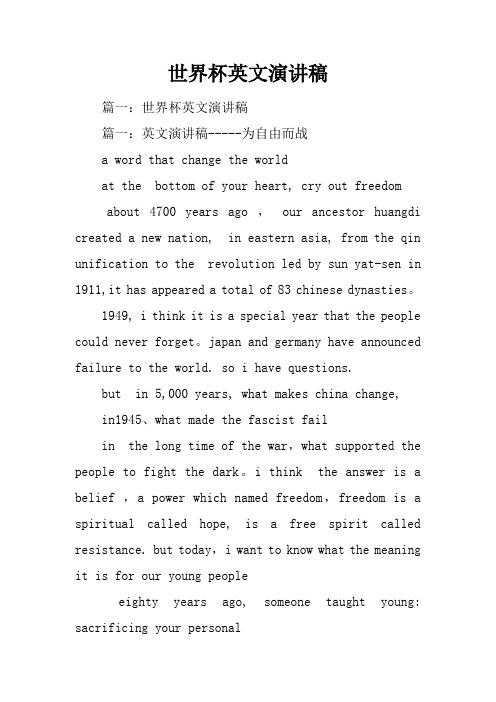
世界杯英文演讲稿篇一:世界杯英文演讲稿篇一:英文演讲稿-----为自由而战a word that change the worldat the bottom of your heart, cry out freedomabout 4700 years ago ,our ancestor huangdi created a new nation, in eastern asia, from the qin unification to the revolution led by sun yat-sen in 1911,it has appeared a total of 83 chinese dynasties。
1949, i think it is a special year that the people could never forget。
japan and germany have announced failure to the world. so i have questions.but in 5,000 years, what makes china change,in1945、what made the fascist failin the long time of the war,what supported the people to fight the dark。
i think the answer is a belief ,a power which named freedom,freedom is a spiritual called hope, is a free spirit called resistance. but today,i want to know what the meaning it is for our young peopleeighty years ago, someone taught young: sacrificing your personalfreedom is to seek free for your country! but then,a person mr hu shih had told them : fighting your personal freedom is the national freedom struggle!, fighting for your free personality, is the free for the country! but today, we have forget it。
英文演讲之成功的八大秘诀(带翻译)

Richard St. John: 8 secrets of successAbout this talkWhy do people succeed? Is it because they're smart? Or are they just lucky? Neither. Analyst Richard St. John condenses years of interviews into an unmissable 3-minute slideshow on the real secrets of success.About Richard St. JohnA self-described average guy who found success doing what he loved, Richard St. John spent more than a decade researching the lessons of success -- and distilling them into 8 words, 3 minutes and one successful book.TranscriptThis is really a two hour presentation I give to high school students, cut down to three minutes. And it all started one day on a plane, on my way to TED, seven years ago. And in the seat next to me was a high school student, a teenager, and she came from a really poor family. And she wanted to make something of her life, and she asked me a simple little question. She said, "What leads to success?" And I felt really badly, because I couldn't give her a good answer. So I get off the plane, and I come to TED. And I think, jeez, I'm in the middle of a room of successful people! So why don't I ask them what helped them succeed, and pass it on to kids? So here we are, seven years, 500 interviews later, and I'm gonna tell you what really leads to success and makes TED-sters tick.Passion:And the first thing is passion. Freeman Thomas says, "I'm driven by my passion." TED-sters do it for love, they don't do it for money. Carol Coletta says, "I would pay someone to do what I do." And the interesting thing is, if you do it for love, the money comes anyway.Work:Work! Rupert Murdoch said to me, "It's all hard work. Nothing comes easily. But I have a lot of fun." Did he say fun? Rupert? Yes! TED-sters do have fun working. And they work hard. I figured, they're not workaholics. They're workafrolics.Good:Good! Alex Garden says, "To be successful put your nose down in something and get damn good at it." There's no magic, it's practice, practice, practice.Focus:And it's focus. Norman Jewison said to me, "I think it all has to do with focusing yourself on one thing"Push:And push! David Gallo says, "Push yourself. Physically, mentally,you've gotta push, push, push." You gotta push through shyness andself-doubt. Goldie Hawn says, "I always had self-doubts. I wasn't good enough, I wasn't smart enough. I didn't think I'd make it." Now it's not always easy to push yourself, and that's why they invented mothers. (Laughter) Frank Gehry -- Frank Gehry said to me, "My mother pushed me."Serve:Serve! Sherwin Nuland says, "It was a privilege to serve as a doctor." Now a lot of kids tell me they want to be millionaires. And the first thing I say to them is, "OK, well you can't serve yourself, you gotta serve others something of value. Because that's the way people really get rich."Ideas:Ideas. TED-ster Bill Gates says, "I had an idea -- founding the first micro-computer software company." I'd say it was a pretty good idea. And there's no magic to creativity in coming up with ideas, it's just doing some very simple things. And I give lots of evidence.Persist:Persist. Joe Kraus says, "Persistence is the number one reason for our success." You gotta persist through failure. You gotta persist through crap! Which of course means "Criticism, Rejection, Assholes and Pressure." (Laughter)So, the big -- the answer to this question is simple: Pay 4,000 bucks and come to TED. Or failing that, do the eight things -- and trust me, these are the big eight things that lead to success.Thank you TED-sters for all your interviews!人们为什么会成功吗?这是因为他们很聪明?或者他们只是幸运?既不。
外交部翻译孙宁在全国英语演讲比赛上的演讲稿
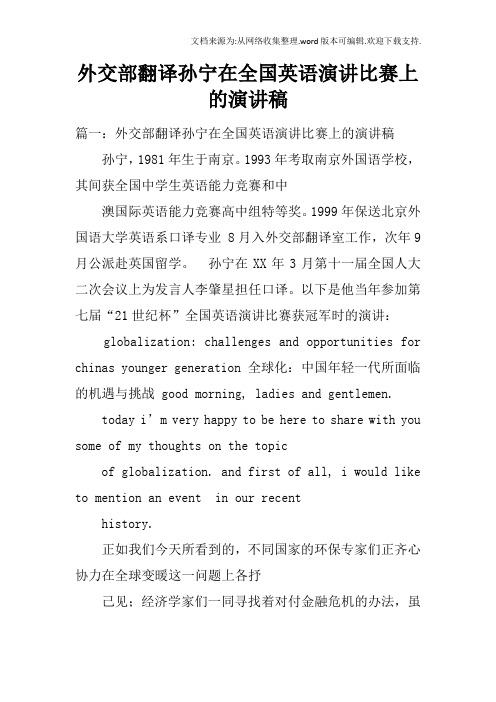
外交部翻译孙宁在全国英语演讲比赛上的演讲稿篇一:外交部翻译孙宁在全国英语演讲比赛上的演讲稿孙宁,1981年生于南京。
1993年考取南京外国语学校,其间获全国中学生英语能力竞赛和中澳国际英语能力竞赛高中组特等奖。
1999年保送北京外国语大学英语系口译专业 8月入外交部翻译室工作,次年9月公派赴英国留学。
孙宁在XX年3月第十一届全国人大二次会议上为发言人李肇星担任口译。
以下是他当年参加第七届“21世纪杯”全国英语演讲比赛获冠军时的演讲:globalization: challenges and opportunities for chinas younger generation 全球化:中国年轻一代所面临的机遇与挑战 good morning, ladies and gentlemen.today i’m very happy to be here to share with you some of my thoughts on the topicof globalization. and first of all, i would like to mention an event in our recenthistory.正如我们今天所看到的,不同国家的环保专家们正齐心协力在全球变暖这一问题上各抒己见;经济学家们一同寻找着对付金融危机的办法,虽然这一危机只发生在一定区域,但它还是会阻碍世界经济的发展;外交官和政治家们则聚到一起探讨打击恐怖主义的问题。
和平与繁荣已成为全世界共同奋斗的目标。
如此强大趋势的“全球化”正应证了e. m. 福斯特的那句话:“但求沟通!”decision-making, ruthless expansionists in the global market place and adevastating presence to local businesses.卡尔·马克思提醒我们,资本跨越国界,便会逃离对象国政治实体的管制,这一点已成为现实。
第八届华东师范大学-《英语世界》杯
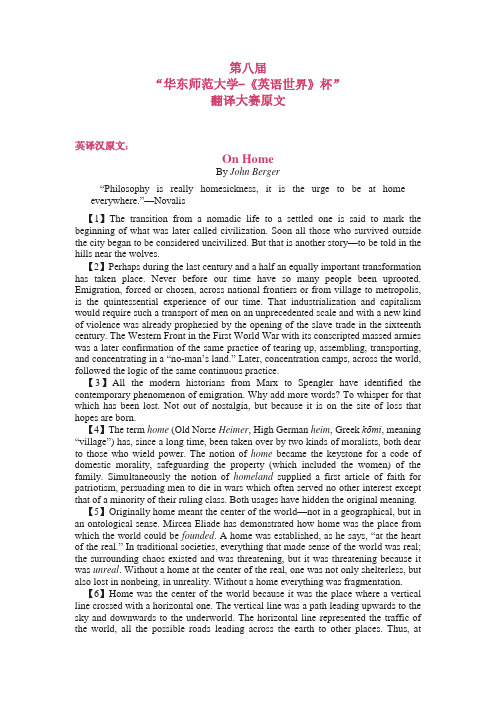
第八届“华东师范大学-《英语世界》杯”翻译大赛原文英译汉原文:On HomeBy John Berger“Philosophy is really homesickness, it is the urge to be at home everywhere.”—Novalis【1】The transition from a nomadic life to a settled one is said to mark the beginning of what was later called civilization. Soon all those who survived outside the city began to be considered uncivilized. But that is another story—to be told in the hills near the wolves.【2】Perhaps during the last century and a half an equally important transformation has taken place. Never before our time have so many people been uprooted. Emigration, forced or chosen, across national frontiers or from village to metropolis, is the quintessential experience of our time. That industrialization and capitalism would require such a transport of men on an unprecedented scale and with a new kind of violence was already prophesied by the opening of the slave trade in the sixteenth century. The Western Front in the First World War with its conscripted massed armies was a later confirmation of the same practice of tearing up, assembling, transporting, and concentrating in a “no-man’s land.” Later, concentration camps, across the world, followed the logic of the same continuous practice.【3】All the modern historians from Marx to Spengler have identified the contemporary phenomenon of emigration. Why add more words? To whisper for that which has been lost. Not out of nostalgia, but because it is on the site of loss that hopes are born.【4】The term home (Old Norse Heimer, High German heim, Greek kōmi, meaning “village”) has, since a long time, been taken over by two kinds of moralists, both dear to those who wield power. The notion of home became the keystone for a code of domestic morality, safeguarding the property (which included the women) of the family. Simultaneously the notion of homeland supplied a first article of faith for patriotism, persuading men to die in wars which often served no other interest except that of a minority of their ruling class. Both usages have hidden the original meaning. 【5】Originally home meant the center of the world—not in a geographical, but in an ontological sense. Mircea Eliade has demonstrated how home was the place from which the world could be founded. A home was established, as he says, “at the heart of the real.” In traditional societies, everything that made sense of the world was real; the surrounding chaos existed and was threatening, but it was threatening because it was unreal. Without a home at the center of the real, one was not only shelterless, but also lost in nonbeing, in unreality. Without a home everything was fragmentation. 【6】Home was the center of the world because it was the place where a vertical line crossed with a horizontal one. The vertical line was a path leading upwards to the sky and downwards to the underworld. The horizontal line represented the traffic of the world, all the possible roads leading across the earth to other places. Thus, athome, one was nearest to the gods in the sky and to the dead in the underworld. This nearness promised access to both. And at the same time, one was at the starting point and, hopefully, the returning point of all terrestrial journeys.【7】The crossing of the two lines, the reassurance their intersection promises, was probably already there, in embryo, in the thinking and beliefs of nomadic people, but they carried the vertical line with them, as they might carry a tent pole. Perhaps at the end of this century of unprecedented transportation, vestiges of the reassurance still remain in the unarticulated feelings of many millions of displaced people.【8】Emigration does not only involve leaving behind, crossing water, living amongst strangers, but also, undoing the very meaning of the world and—at its most extreme—abandoning oneself to the unreal which is the absurd.【9】Emigration, when it is not enforced at gunpoint, may of course be prompted by hope as well as desperation. For example, to the peasant son the father’s traditional authority may seem more oppressively absurd than any chaos. The poverty of the village may appear more absurd than the crimes of the metropolis. To live and die amongst foreigners may seem less absurd then to live persecuted or tortured by one’s fellow countrymen. All this can be true. But to emigrate is always to dismantle the center of the world, and so to move into a lost, disoriented one of fragments.汉译英原文:家(节选)文/周国平【1】家庭是人类一切社会组织中最自然的社会组织,是把人与大地、与生命的源头联结起来的主要纽带。
21世纪爱立信杯英语演讲比赛冠军得主演讲稿_英语演讲稿_
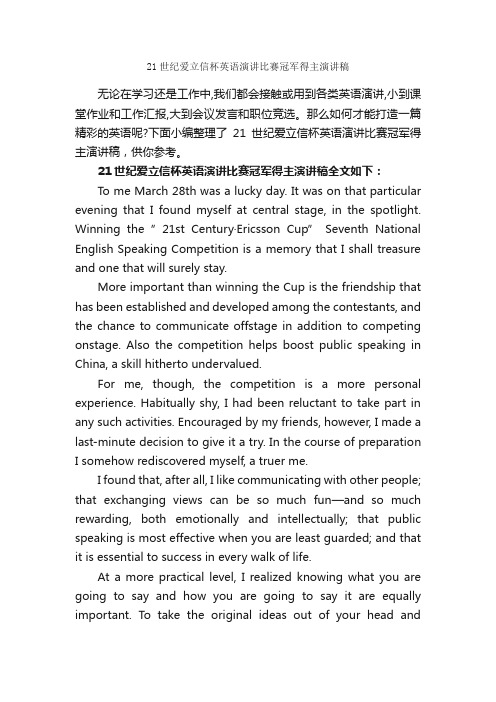
21世纪爱立信杯英语演讲比赛冠军得主演讲稿无论在学习还是工作中,我们都会接触或用到各类英语演讲,小到课堂作业和工作汇报,大到会议发言和职位竞选。
那么如何才能打造一篇精彩的英语呢?下面小编整理了21世纪爱立信杯英语演讲比赛冠军得主演讲稿,供你参考。
21世纪爱立信杯英语演讲比赛冠军得主演讲稿全文如下:To me March 28th was a lucky day. It was on that particular evening that I found myself at central stage, in the spotlight. Winning the ”21st Century·Ericsson Cup” Seventh National English Speaking Competition is a memory that I shall treasure and one that will surely stay.More important than winning the Cup is the friendship that has been established and developed among the contestants, and the chance to communicate offstage in addition to competing onstage. Also the competition helps boost public speaking in China, a skill hitherto undervalued.For me, though, the competition is a more personal experience. Habitually shy, I had been reluctant to take part in any such activities. Encouraged by my friends, however, I made a last-minute decision to give it a try. In the course of preparation I somehow rediscovered myself, a truer me.I found that, after all, I like communicating with other people; that exchanging views can be so much fun—and so much rewarding, both emotionally and intellectually; that public speaking is most effective when you are least guarded; and that it is essential to success in every walk of life.At a more practical level, I realized knowing what you are going to say and how you are going to say it are equally important. To take the original ideas out of your head andtransplant them, so to speak, to that of others, you need to have an organized mind. This ability improves with training.Yet there should not be any loss or addition or distortion in the process. Those ideas that finally find their way into another head need to be recognizably yours. Language is a means to transmit information, not a means to obstruct communication. It should be lucid to be penetrating.In China, certain public speaking skills have been unduly emphasized. Will it really help, we are compelled to ask, to bang at the podium or yell at the top of your lungs, if you have come with a poorly organized speech, a muddled mind, and unwillingness to truly share your views?Above all, the single most important thing I learnt was that as a public speaker, you need to pay attention, first and foremost, to the content of your speech. And second, the structure of your speech: how one idea relates and progresses to another.Only after these come delivery and non-verbal communication: speed control, platform manner, and so on. Pronunciation is important, yet of greater importance is this: Is your language competent enough to express your ideas exactly the way you intend them to be understood?I was informed afterwards that I was chosen to be the winner for my ”appropriately worded speech, excellent presence and quick-witted response”. In so remarking, the judges clearly showed their preference: they come to listen for meaningful ideas, not for loose judgments, nor easy laughters.Some contestants failed to address their questions head on. Some were able to, but did not know where to stop—the dragging on betrayed their lack of confidence. The root cause was that they did not listen attentively to the questions. Or theywere thinking of what they had prepared.As I said in my speech, ”It is vitally important that we young people do more serious thinking ... to take them [issues like globalization] on and give them honest thinking is the first step to be prepared for both opportunities and challenges coming our way”. We need to respond honestly.A competition like this draws talented students from all over the country. And of course, I learnt more things than just about public speaking. Since in the final analysis, public speaking is all about effective communication. And this goes true for all communications, whatever their setting.And the following is the final version of my speech:GLOBALIZATION: OPPORTUNITIES AND CHALLENGES FOR CHINA'S YOUNGER GENERATIONThirty years ago, American President Richard Nixon made an epoch-making visit to China, a country still isolated at that time. Premier Zhou Enlai said to him, ”Your handshake came over the vastest ocean in the world—twenty-five years of no communication”. Thirty years since, China and America have exchanged many handshakes. The fundamental implication of this example is that the need to communicate across differences in culture and ideology is not only felt by the two countries but by many other nations as well.As we can see today, environmentalists from different countries are making joint efforts to address the issue of global warming, economists are seeking solutions to financial crises that rage in a particular region but nonetheless cripple the world economy, and politicians and diplomats are getting together to discuss the issue of combating terrorism. Peace and prosperity has become a common goal that we are striving for all over theworld. Underlying this mighty trend of global communication is the echo of E. M. Forster's words ”Only connect!”With the IT revolution, traditional boundaries of human society fall away. Our culture, politics, society and commerce are being sloshed into one large melting pot of humanity. In this interlinked world, there are no outsiders, for a disturbance in one place is likely to impact other parts of the globe. We have begun to realize that a world divided cannot endure.China is now actively integrating into the world. Our recent entry to the WTO is a good example. For decades, we have taken pride in being self-reliant, but now we realize the importance of participating in and contributing to a broader economic order. From a precarious role in the world arena to our present WTO membership, we have come a long way.But what does the way ahead look like? In some parts of the world people are demonstrating against globalization. Are they justified, then, in criticizing the globalizing world? Instead of narrowing the gap between the rich and the poor, they say, globalization enables the developed nations to swallow the developing nations' wealth in debts and interest. Globalization, they argue, should be about a common interest in every other nation's economic health.We are reminded by Karl Marx that capital goes beyond national borders and eludes control from any other entity. This has become a reality. Multinational corporations are seeking the lowest cost, the largest market, and the most favourable policy. They are often powerful lobbyists in government decision-making, ruthless expansionists in the global market and a devastating presence to local businesses.For China, still more challenges exist. How are we going toensure a smooth transition from the planned economy to a market-based one? How to construct a legal system that is sound enough and broad enough to respond to the needs of a dynamic society? How to maintain our cultural identity in an increasingly homogeneous world? And how to define greatness in our rise as a peace-loving nation? Globalization entails questions that concern us all.Like many young people my age in China, I want to see my country get prosperous and enjoy respect in the international community. But it seems to me that mere patriotism is not just enough. It is vitally important that we young people do more serious thinking and broaden our mind to bigger issues. There might never be easy answers to those issues such as globalization, but to take them on and give them honest thinking is the first step to be prepared for both opportunities and challenges coming our way. This is also one of the thoughts that came to me while preparing this speech.21世纪杯:“21世纪杯”全国英语演讲比赛由中国日报社于1996年发起并主办,由英文《21世纪报》承办。
第八届爱立信杯英文演讲第一名顾秋培的演讲稿(附中文翻译)
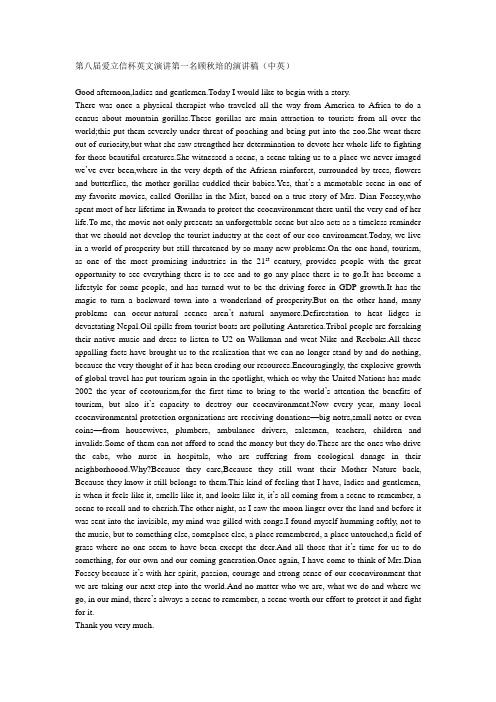
第八届爱立信杯英文演讲第一名顾秋培的演讲稿(中英)Good afternoon,ladies and gentlemen.Today I would like to begin with a story.There was once a physical therapist who traveled all the way from America to Africa to do a census about mountain gorillas.These gorillas are main attraction to tourists from all over the world;this put them severely under threat of poaching and being put into the zoo.She went there out of curiosity,but what she saw strengthed her determination to devote her whole life to fighting for those beautiful creatures.She witnessed a scene, a scene taking us to a place we never imaged we’ve ever been,where in the very depth of the African rainforest, surrounded by trees, flowers and butterflies, the mother gorillas cuddled their babies.Yes, that’s a memotable scene in one of my favorite movies, called Gorillas in the Mist, based on a true story of Mrs. Dian Fossey,who spent most of her lifetime in Rwanda to protect the ecoenvironment there until the very end of her life.To me, the movie not only presents an unforgettable scene but also acts as a timeless reminder that we should not develop the tourist industry at the cost of our eco-environment.Today, we live in a world of prosperity but still threatened by so many new problems.On the one hand, tourism, as one of the most promising industries in the 21st century, provides people with the great opportunity to see everything there is to see and to go any place there is to go.It has become a lifestyle for some people, and has turned wut to be the driving force in GDP growth.It has the magic to turn a backward town into a wonderland of prosperity.But on the other hand, many problems can occur-natural scenes aren’t natural anymore.Defirestation to heat lidges is devastating Nepal.Oil spills from tourist boats are polluting Antarctica.Tribal people are forsaking their native music and dress to listen to U2 on Walkman and weat Nike and Reeboks.All these appalling facts have brought us to the realization that we can no longer stand by and do nothing, because the very thought of it has been eroding our resources.Encouragingly, the explosive growth of global travel has put tourism again in the spotlight, which os why the United Nations has made 2002 the year of ecotourism,for the first time to bring to the world’s attention the benefits of tourism, but also it’s capacity to destroy our ecoenvironment.Now every year, many local ecoenvironmental protection organizations are receiving donations—big notrs,small notes or even coins—from housewives, plumbers, ambulance drivers, salesmen, teachers, children and invalids.Some of them can not afford to send the money but they do.These are the ones who drive the cabs, who nurse in hospitals, who are suffering from ecological danage in their neighborhoood.Why?Because they care,Because they still want their Mother Nature back, Because they know it still belongs to them.This kind of feeling that I have, ladies and gentlemen, is when it feels like it, smells like it, and looks like it, it’s all coming from a scene to remember, a scene to recall and to cherish.The other night, as I saw the moon linger over the land and before it was sent into the invisible, my mind was gilled with songs.I found myself humming softly, not to the music, but to something else, someplace else, a place remembered, a place untouched,a field of grass where no one seem to have been except the deer.And all those that it’s time for us to do something, for our own and our coming generation.Once again, I have come to think of Mrs.Dian Fossey because it’s with her spirit, passion, courage and strong sense of our ecoenvironment that we are taking our next step into the world.And no matter who we are, what we do and where we go, in our mind, there’s always a scene to remember, a scene worth our effort to protect it and fight for it.Thank you very much.Q:Thanks, contestant #18.The topic for your impromptu speech is: Which os more inportant for your knowledge from books or personal experience?A:Thank you.I remember, on my very first day of my beloved university, one of my professors said to me,”From now on, you’ll be on a journey between who you think you are and who you can be.The key is to allow yourself to continue the journey in the ocean of the books.”And I do learn a lot from books:I know the geometry of Euclid,logic of Aristotle, fable of Aesop known to chikdren around the world.Well, no sffense to all those great authors of the books, but during my three years at my university, I do realize that personal experience through practice means more to me.As we in this global information age where both economic growth and individual opportunity are based on ideas, a commitment to providing all human beings the golden opportunity to develop themselves is so vital, not only to the people here. But all sround.As we are in this transformational age where communications and commerce are global, investments are mobile, technology os almost magical, and the ambition for a better life is now tniversal, and I think this is why we are here today.We want to earn our personal experience through practicing our oral English, sharing our opinions of tourism and ecology with all the judges and audience here. And I think we are so lucky to be alive at this moment of the history.Never before have our nation enjoyed so much prosperity and so much social progress with so little internal crises.And never before have our young people had so much great opportuniry to practice ourselves and, therefore, have a profound obligation to build a more perfect nation of our ancestor’s dream.And I think our government had provided us young people with the tools and condition to build the future of our dreams.Even if we know some rules,some regulations, or experiences from our books, we still simply impersonal, somplicated world.Instead, our challenges os to arrive at a consensus values and common vision of what we can do today individually and collectiively to build a strong family and strong community. And above all, make the world a better place for us to live.Thand you very much.今天,我想首先用一个小故事。
乔布斯斯坦福大学演讲稿(中文优秀6篇
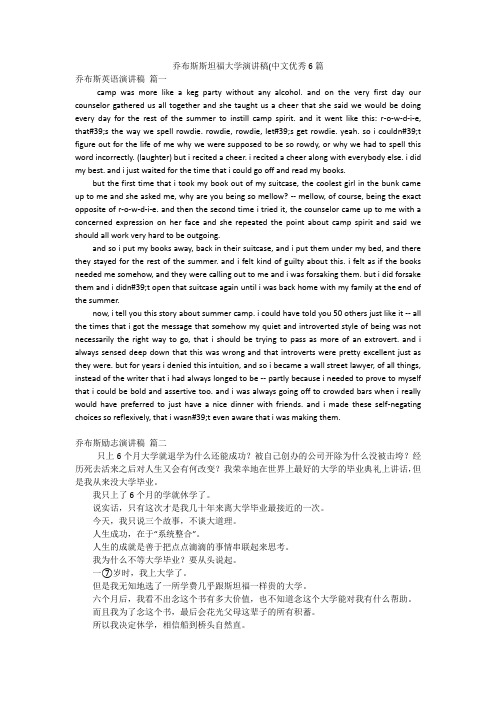
乔布斯斯坦福大学演讲稿(中文优秀6篇乔布斯英语演讲稿篇一camp was more like a keg party without any alcohol. and on the very first day our counselor gathered us all together and she taught us a cheer that she said we would be doing every day for the rest of the summer to instill camp spirit. and it went like this: r-o-w-d-i-e, that#39;s the way we spell rowdie. rowdie, rowdie, let#39;s get rowdie. yeah. so i couldn#39;t figure out for the life of me why we were supposed to be so rowdy, or why we had to spell this word incorrectly. (laughter) but i recited a cheer. i recited a cheer along with everybody else. i did my best. and i just waited for the time that i could go off and read my books.but the first time that i took my book out of my suitcase, the coolest girl in the bunk came up to me and she asked me, why are you being so mellow? -- mellow, of course, being the exact opposite of r-o-w-d-i-e. and then the second time i tried it, the counselor came up to me with a concerned expression on her face and she repeated the point about camp spirit and said we should all work very hard to be outgoing.and so i put my books away, back in their suitcase, and i put them under my bed, and there they stayed for the rest of the summer. and i felt kind of guilty about this. i felt as if the books needed me somehow, and they were calling out to me and i was forsaking them. but i did forsake them and i didn#39;t open that suitcase again until i was back home with my family at the end of the summer.now, i tell you this story about summer camp. i could have told you 50 others just like it -- all the times that i got the message that somehow my quiet and introverted style of being was not necessarily the right way to go, that i should be trying to pass as more of an extrovert. and i always sensed deep down that this was wrong and that introverts were pretty excellent just as they were. but for years i denied this intuition, and so i became a wall street lawyer, of all things, instead of the writer that i had always longed to be -- partly because i needed to prove to myself that i could be bold and assertive too. and i was always going off to crowded bars when i really would have preferred to just have a nice dinner with friends. and i made these self-negating choices so reflexively, that i wasn#39;t even aware that i was making them.乔布斯励志演讲稿篇二只上6个月大学就退学为什么还能成功?被自己创办的公司开除为什么没被击垮?经历死去活来之后对人生又会有何改变?我荣幸地在世界上最好的大学的毕业典礼上讲话,但是我从来没大学毕业。
初中英语名人演讲稿教育,最需要开垦的地方—默克多e-G8峰会素材(最新整理)

教育,最需要开垦的地方—默克多e-G8峰会Education: The Last Frontier 教育:最需要开垦的地方Rupert Murdoch e-G8 Forum Paris e-G8峰会,巴黎24 May 2011 — Maurice, thank you for that gracious introduction.莫里斯,谢谢你帮我做的自我介绍Thank you as well for the invitation to speak today.同时谢谢你邀请我来演讲We are living through a time when many of our leading economies are notperforming as they should.我们今天处在一个很多经济强国没有尽到他们责任的时代.To this challenge, this audience brings the promise of digital and the spirit of innovation. So I know you are all as pleased as I am that the G-8 leaders have made your contributions to economic growth a priority for their meeting this week. 为了迎接这个挑战,现场在座的各位都带来了他们的在电子创新领域的承诺和精神。
G-8的领导人们在这次峰会上把你们对经济的贡献作为一项重要的议程,我也为各位开心,In particular, I wish to thank President Sarkozy and our French hosts。
Not onlyhave they provided this magnificent setting, they remind us of a truth reflected in the proud history of this great nation: that artists and creators add great value to society. We hope the G-8 will strongly affirm that the property rights of artists and creators are more than a matter of protecting cultures。
- 1、下载文档前请自行甄别文档内容的完整性,平台不提供额外的编辑、内容补充、找答案等附加服务。
- 2、"仅部分预览"的文档,不可在线预览部分如存在完整性等问题,可反馈申请退款(可完整预览的文档不适用该条件!)。
- 3、如文档侵犯您的权益,请联系客服反馈,我们会尽快为您处理(人工客服工作时间:9:00-18:30)。
第八届爱立信杯英文演讲第一名顾秋培的演讲稿(中英)Good afternoon,ladies and gentlemen.Today I would like to begin with a story.There was once a physical therapist who traveled all the way from America to Africa to do a census about mountain gorillas.These gorillas are main attraction to tourists from all over the world;this put them severely under threat of poaching and being put into the zoo.She went there out of curiosity,but what she saw strengthed her determination to devote her whole life to fighting for those beautiful creatures.She witnessed a scene, a scene taking us to a place we never imaged we’ve ever been,where in the very depth of the African rainforest, surrounded by trees, flowers and butterflies, the mother gorillas cuddled their babies.Yes, that’s a memotable scene in one of my favorite movies, called Gorillas in the Mist, based on a true story of Mrs. Dian Fossey,who spent most of her lifetime in Rwanda to protect the ecoenvironment there until the very end of her life.To me, the movie not only presents an unforgettable scene but also acts as a timeless reminder that we should not develop the tourist industry at the cost of our eco-environment.Today, we live in a world of prosperity but still threatened by so many new problems.On the one hand, tourism, as one of the most promising industries in the 21st century, provides people with the great opportunity to see everything there is to see and to go any place there is to go.It has become a lifestyle for some people, and has turned wut to be the driving force in GDP growth.It has the magic to turn a backward town into a wonderland of prosperity.But on the other hand, many problems can occur-natural scenes aren’t natural anymore.Defirestation to heat lidges is devastating Nepal.Oil spills from tourist boats are polluting Antarctica.Tribal people are forsaking their native music and dress to listen to U2 on Walkman and weat Nike and Reeboks.All these appalling facts have brought us to the realization that we can no longer stand by and do nothing, because the very thought of it has been eroding our resources.Encouragingly, the explosive growth of global travel has put tourism again in the spotlight, which os why the United Nations has made 2002 the year of ecotourism,for the first time to bring to the world’s attention the benefits of tourism, but also it’s capacity to destroy our ecoenvironment.Now every year, many local ecoenvironmental protection organizations are receiving donations—big notrs,small notes or even coins—from housewives, plumbers, ambulance drivers, salesmen, teachers, children and invalids.Some of them can not afford to send the money but they do.These are the ones who drive the cabs, who nurse in hospitals, who are suffering from ecological danage in their neighborhoood.Why?Because they care,Because they still want their Mother Nature back, Because they know it still belongs to them.This kind of feeling that I have, ladies and gentlemen, is when it feels like it, smells like it, and looks like ot, it’s all coming from a scene to remember, a scene to recall and to cherish.The other night, as I saw the moon linger over the land and before it was sent into the invisible, ny mind was gilled with songs.I found myself humming softly, not to the music, but to something else, someplace else, a place remembered, a place untouched,a field of grass where no one seem to have been except the deer.And all those that it’s time for us to do sonething, for our own and our coming generation.Once again, I habe come to think of Mrs.Dian Fossey because it’s with her spirit, passion, sourage and strong sense of our ecoenvironment that we are taking our next step into the world.And no matter who we are, what we do and where we go, in our mind, there’s always a scene to remember, a scene worth our effort to protect it and fight for it.Thank you very much.Q:Thanks, contestant #18.The topic for your impromptu speech is: Which os more inportant for your knowledge from books or personal experience?A:Thank you.I remember, on my very first day of my beloved university, one of my professors said to me,”From now on, you’ll be on a journey between who you think you are and who you can be.The key is to allow yourself to continue the journey in the ocean of the books.”And I do learn a lot from books:I know the geometry of Euclid,logic of Aristotle, fable of Aesop known to chikdren around the world.Well, no sffense to all those great authors of the books, but during my three years at my university, I do realize that personal experience through practice means more to me.As we in this global information age where both economic growth and individual opportunity are based on ideas, a commitment to providing all human beings the golden opportunity to develop themselves is so vital, not only to the people here. But all sround.As we are in this transformational age where communications and commerce are global, investments are mobile, technology os almost magical, and the ambition for a better life is now tniversal, and I think this is why we are here today.We want to earn our personal experience through practicing our oral English, sharing our opinions of tourism and ecology with all the judges and audience here. And I think we are so lucky to be alive at this moment of the history.Never before have our nation enjoyed so much prosperity and so much social progress with so little internal crises.And never before have our young people had so much great opportuniry to practice ourselves and, therefore, have a profound obligation to build a more perfect nation of our ancestor’s dream.And I think our government had provided us young people with the tools and condition to build the future of our dreams.Even if we know some rules,some regulations, or experiences from our books, we still simply impersonal, somplicated world.Instead, our challenges os to arrive at a consensus values and common vision of what we can do today individually and collectiively to build a strong family and strong community. And above all, make the world a better place for us to live.Thand you very much.今天,我想首先用一个小故事。
